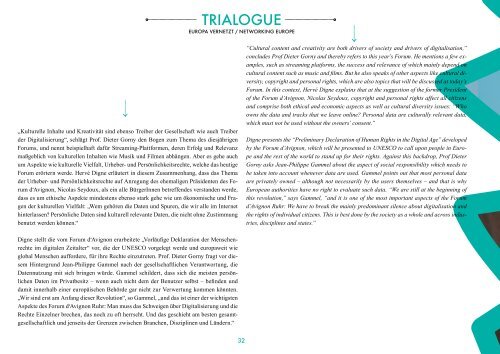DIGITAL IST KULTUR CULTURE IS DIGITAL – DIGITAL IS CULTURE
1n3RpM7
1n3RpM7
Erfolgreiche ePaper selbst erstellen
Machen Sie aus Ihren PDF Publikationen ein blätterbares Flipbook mit unserer einzigartigen Google optimierten e-Paper Software.
TRIALOGUE<br />
EUROPA VERNETZT / NETWORKING EUROPE<br />
„Kulturelle Inhalte und Kreativität sind ebenso Treiber der Gesellschaft wie auch Treiber<br />
der Digitalisierung“, schlägt Prof. Dieter Gorny den Bogen zum Thema des diesjährigen<br />
Forums, und nennt beispielhaft dafür Streaming-Plattformen, deren Erfolg und Relevanz<br />
maßgeblich von kulturellen Inhalten wie Musik und Filmen abhängen. Aber es gehe auch<br />
um Aspekte wie kulturelle Vielfalt, Urheber- und Persönlichkeitsrechte, welche das heutige<br />
Forum erörtern werde. Hervé Digne erläutert in diesem Zusammenhang, dass das Thema<br />
der Urheber- und Persönlichkeitsrechte auf Anregung des ehemaligen Präsidenten des Forum<br />
d‘Avignon, Nicolas Seydoux, als ein alle BürgerInnen betreffendes verstanden werde,<br />
dass es um ethische Aspekte mindestens ebenso stark gehe wie um ökonomische und Fragen<br />
der kulturellen Vielfalt: „Wem gehören die Daten und Spuren, die wir alle im Internet<br />
hinterlassen? Persönliche Daten sind kulturell relevante Daten, die nicht ohne Zustimmung<br />
benutzt werden können.“<br />
“Cultural content and creativity are both drivers of society and drivers of digitalisation,”<br />
concludes Prof Dieter Gorny and thereby refers to this year’s Forum. He mentions a few examples,<br />
such as streaming platforms, the success and relevance of which mainly depend on<br />
cultural content such as music and films. But he also speaks of other aspects like cultural diversity,<br />
copyright and personal rights, which are also topics that will be discussed at today’s<br />
Forum. In this context, Hervé Digne explains that at the suggestion of the former President<br />
of the Forum d’Avignon, Nicolas Seydoux, copyright and personal rights affect all citizens<br />
and comprise both ethical and economic aspects as well as cultural diversity issues: “Who<br />
owns the data and tracks that we leave online? Personal data are culturally relevant data,<br />
which must not be used without the owners’ consent.”<br />
Digne presents the “Preliminary Declaration of Human Rights in the Digital Age” developed<br />
by the Forum d’Avignon, which will be presented to UNESCO to call upon people in Europe<br />
and the rest of the world to stand up for their rights. Against this backdrop, Prof Dieter<br />
Gorny asks Jean-Philippe Gammel about the aspect of social responsibility which needs to<br />
be taken into account whenever data are used. Gammel points out that most personal data<br />
are privately owned <strong>–</strong> although not necessarily by the users themselves <strong>–</strong> and that is why<br />
European authorities have no right to evaluate such data. “We are still at the beginning of<br />
this revolution,” says Gammel, “and it is one of the most important aspects of the Forum<br />
d’Avignon Ruhr: We have to break the mainly predominant silence about digitalisation and<br />
the rights of individual citizens. This is best done by the society as a whole and across industries,<br />
disciplines and states.”<br />
Digne stellt die vom Forum d‘Avignon erarbeitete „Vorläufige Deklaration der Menschenrechte<br />
im digitalen Zeitalter“ vor, die der UNESCO vorgelegt werde und europaweit wie<br />
global Menschen auffordere, für ihre Rechte einzutreten. Prof. Dieter Gorny fragt vor diesem<br />
Hintergrund Jean-Philippe Gammel nach der gesellschaftlichen Verantwortung, die<br />
Datennutzung mit sich bringen würde. Gammel schildert, dass sich die meisten persönlichen<br />
Daten im Privatbesitz <strong>–</strong> wenn auch nicht dem der Benutzer selbst <strong>–</strong> befinden und<br />
damit innerhalb einer europäischen Behörde gar nicht zur Verwertung kommen könnten.<br />
„Wir sind erst am Anfang dieser Revolution“, so Gammel, „und das ist einer der wichtigsten<br />
Aspekte des Forum d‘Avignon Ruhr: Man muss das Schweigen über Digitalisierung und die<br />
Rechte Einzelner brechen, das noch zu oft herrscht. Und das geschieht am besten gesamtgesellschaftlich<br />
und jenseits der Grenzen zwischen Branchen, Disziplinen und Ländern.“<br />
32


